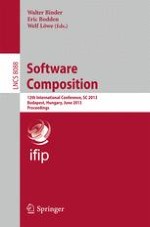The book constitutes the refereed proceedings of the 12th International Conference on Software Composition, SC 2013, held in Budapest, Hungary, in June 2013, co-located with the STAF 2013 Federated Conferences. The 9 revised full papers were carefully reviewed and selected from 21 submissions for inclusion in the book. The papers reflect all current research in software composition, including but not limited to component-based software engineering; composition and adaption techniques; composition algebras, calculi, and type systems; feature-oriented software development; verification, validation, and testing; dynamic composition and reconfiguration.
